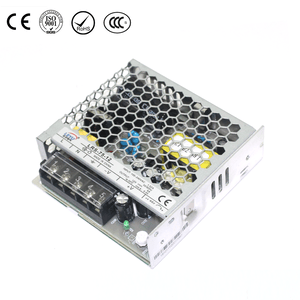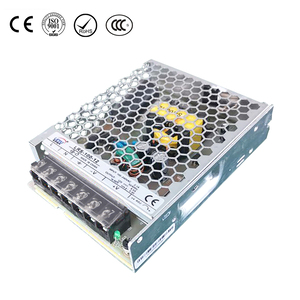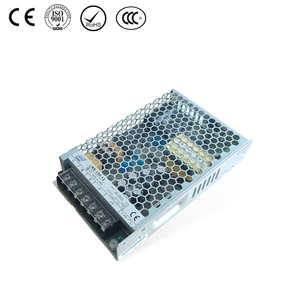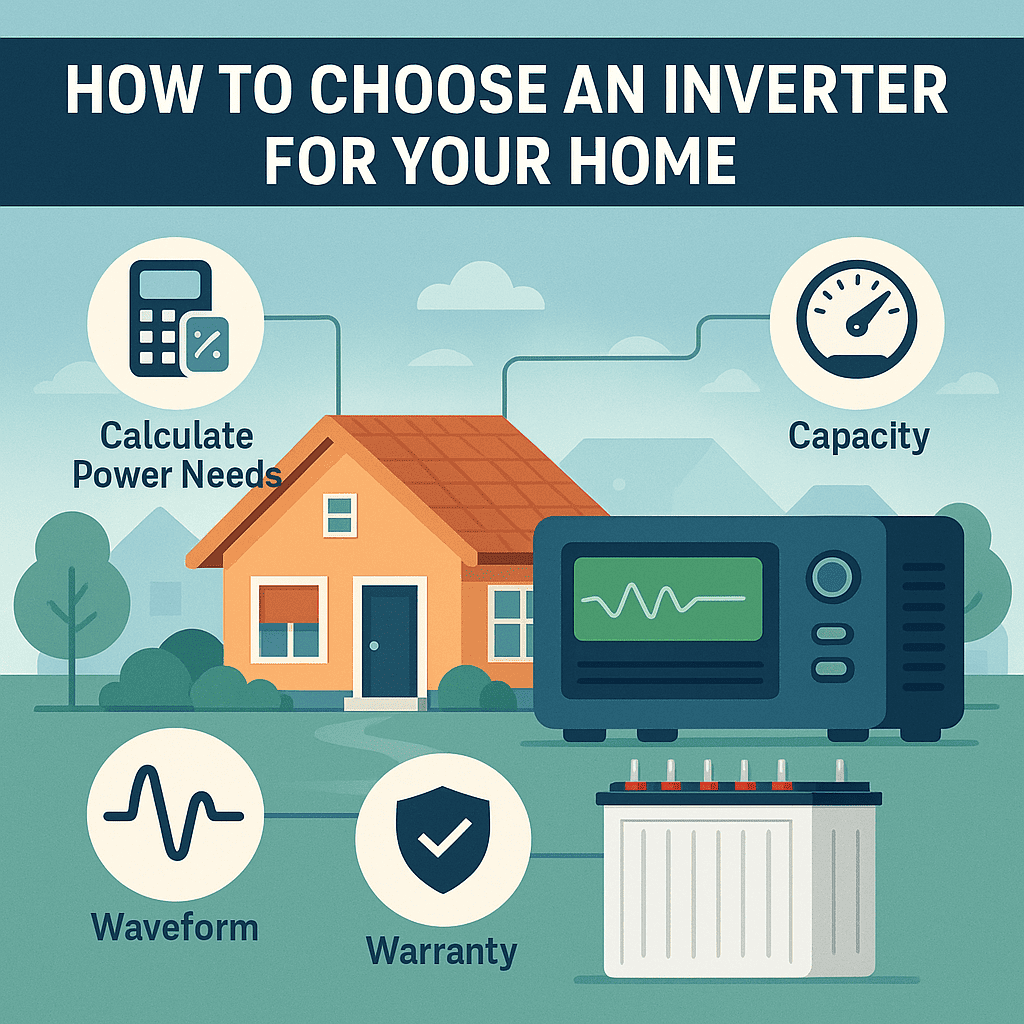Which inverter is best for the home
Date:2025-05-16 01:45:05 Visit:769
Imagine a world where sudden power outages are a thing of the past and every home is equipped with a reliable source of backup power. Inverters have become an essential component for maintaining an uninterrupted power supply. They play a crucial role in converting direct current (DC) into alternating current (AC), allowing appliances to run smoothly during power cuts.
Choosing the right inverter requires understanding the basics, such as determining your home's power needs and the specific capacity necessary for optimal performance. Here's what you should consider:
- Calculate power needs to avoid overloading.
- Capacity determines efficiency and performance.
Say goodbye to confusion as we guide you through the world of inverters, from understanding different types and efficiency levels to evaluating key specifications like waveform and recharge time. Learn about the importance of warranty, maintenance, and brand reputation. Discover features to look for in an inverter that best suits your home. Plus, we’ll help you pair inverters with the right batteries to ensure a seamless power experience.
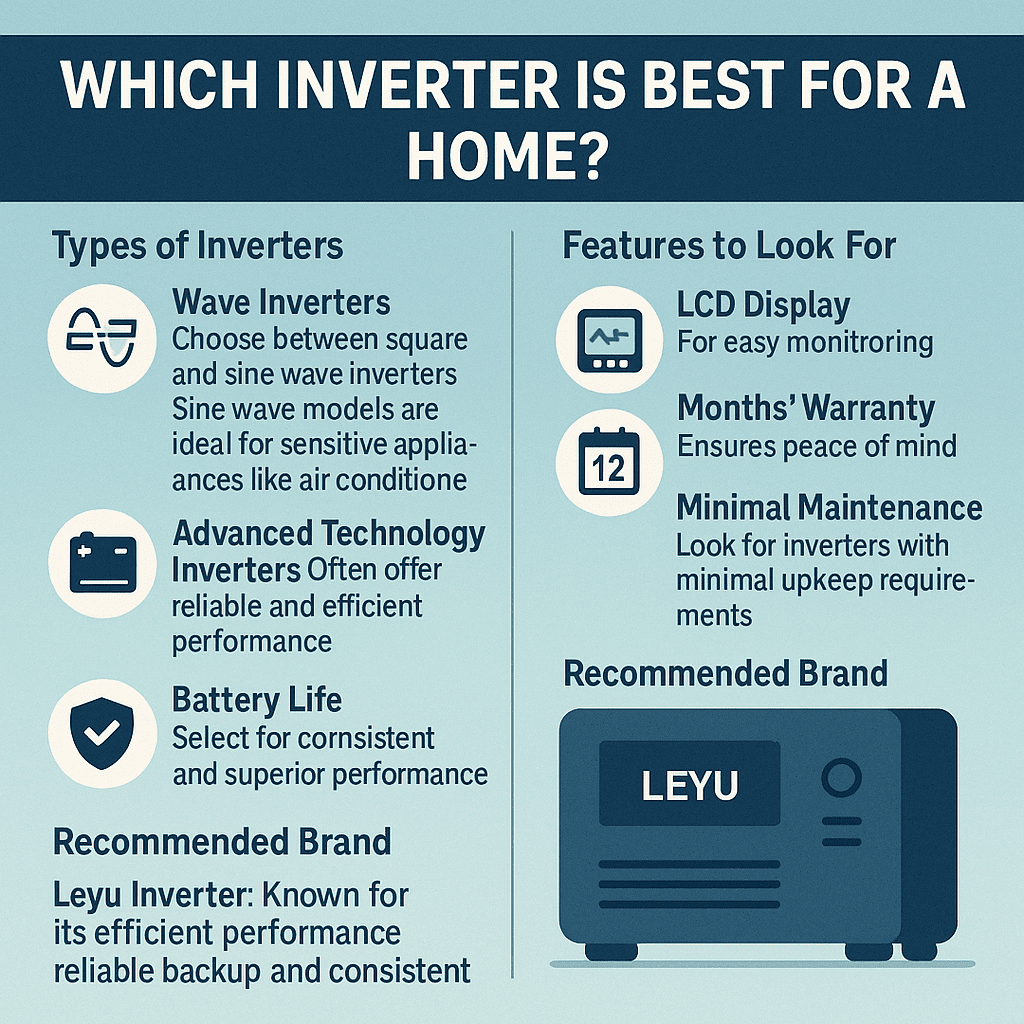
Which inverter is best for a home?
Choosing the perfect inverter for your home can make a big difference, especially if you face frequent power cuts. Here’s a friendly guide to help you decide:
Types of Inverters:
- Wave Inverters: Choose between square and sine wave inverters. Sine wave models are ideal for sensitive appliances like air conditioners.
- Advanced Technology Inverters: These often offer reliable and efficient performance.
Battery Considerations:
- Types of Batteries: Common options are Lead-acid and Tubular batteries.
- Battery Capacity & Voltage: Ensures a reliable backup and longer backup time.
- Battery Life: Select for consistent and superior performance.
Features to Look For:
- LCD Display: For easy monitoring.
- Months' Warranty: Ensures peace of mind.
- Minimal Maintenance: Look for inverters with minimal upkeep requirements.
Recommended Brand:
- Leyu Inverter: Known for its efficient performance, reliable backup, and consistent performance.
Choosing the right inverter, taking into consideration battery type, wave output, and technology, ensures an uninterrupted power supply and reliable performance.
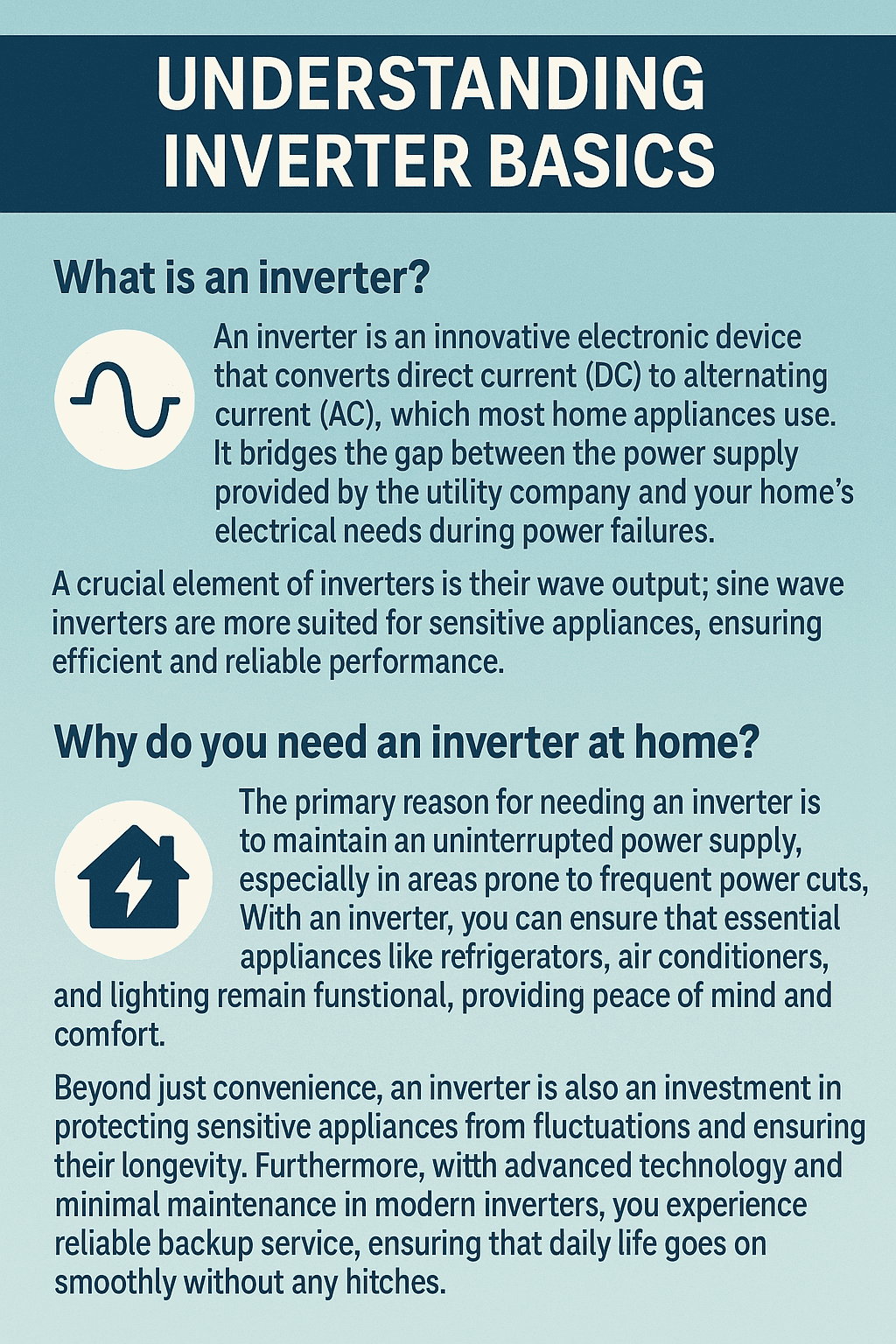
Understanding Inverter Basics
In today's world, where a consistent power supply is often interrupted by frequent power cuts, having an inverter at home has transitioned from being a luxury to a necessity. Inverters are the unsung heroes that ensure our electrical appliances keep running even when the main power is out. Understanding inverter basics can help you make informed decisions and choose the right one for your home. This handy guide will walk you through what an inverter is and why it could be a crucial addition to your household.
What is an inverter?
An inverter is an innovative electronic device that converts direct current (DC) to alternating current (AC), which most home appliances use. It bridges the gap between the power supply provided by the utility company and your home’s electrical needs during power failures. In other words, when there's a power cut, the inverter ensures your lights, fans, and other essential devices stay powered up. A crucial element of inverters is their wave output; sine wave inverters are more suited for sensitive appliances, ensuring efficient and reliable performance.
Why do you need an inverter at home?
The primary reason for needing an inverter is to maintain an uninterrupted power supply, especially in areas prone to frequent power cuts. With an inverter, you can ensure that essential appliances like refrigerators, air conditioners, and lighting remain functional, providing peace of mind and comfort. Beyond just convenience, an inverter is also an investment in protecting sensitive appliances from fluctuations and ensuring their longevity. Furthermore, with advanced technology and minimal maintenance in modern inverters, you experience reliable backup service, ensuring that daily life goes on smoothly without any hitches.
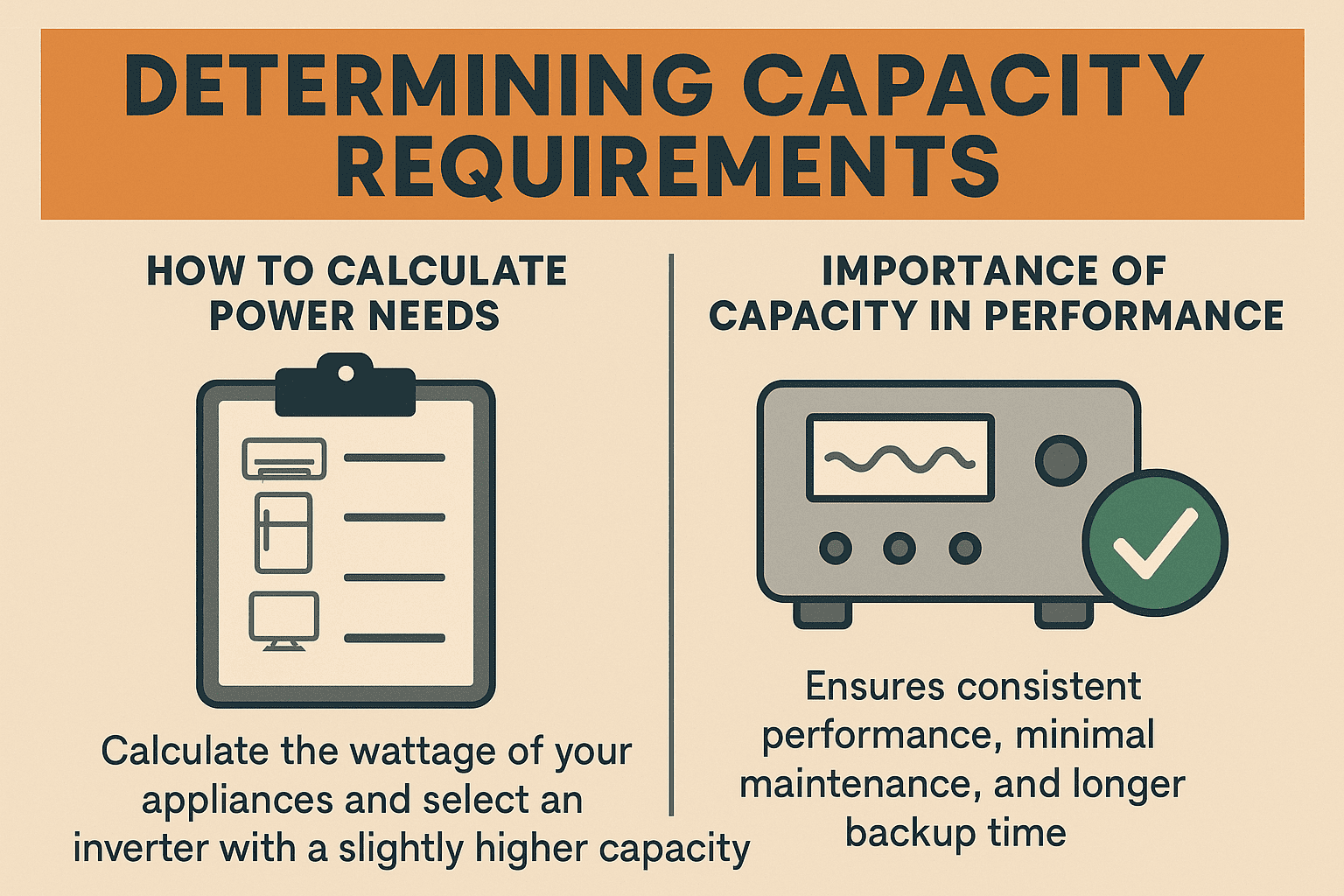
Determining Capacity Requirements
Determining the right inverter for your home is not just about choosing a brand or type; it's about assessing your specific power needs to ensure an uninterrupted power supply during outages. Understanding your home's capacity requirements helps in selecting an inverter that provides reliable performance and peace of mind. If the inverter capacity matches your needs, it can handle your essential devices like air conditioners and sensitive appliances efficiently. Moreover, it can offer consistent and superior performance, minimizing issues like overheating or tripped circuit breakers. With a focus on inverter capacity, you can enjoy minimal maintenance and a longer lifespan for both the inverter and your batteries.
How to calculate power needs
To calculate your power needs, begin by listing all the appliances you intend to connect to the inverter. Each device has a specific wattage that indicates how much power it consumes. For instance, essential devices like refrigerators, televisions, and air conditioners typically require more power compared to lights and fans. Add the wattage of all these appliances to determine your total power requirement. It's essential to account for devices you might use simultaneously to ensure you're covered during frequent power cuts.
Once you have the total wattage, consider selecting an inverter with a slightly higher capacity for peace of mind. This buffer accommodates any additional load and ensures the inverter operates efficiently. The inverter's backup time depends on its battery capacity; thus, opting for a sizeable battery will ensure longer operational hours during outages. Remember, choosing either tubular or lead-acid batteries affects both battery life and performance.
Importance of capacity in performance
The capacity of an inverter plays a crucial role in its overall performance. It dictates how effectively the inverter can provide a stable power supply to your home. A properly sized inverter prevents overloading, which could otherwise decrease performance and increase potential issues. When an inverter meets your capacity requirements, it translates to consistent performance and reliable backup during power outages, giving you peace of mind with every use.
Furthermore, inverters with the right capacity often come equipped with advanced technology features like LCDs and wave output, which offer additional benefits. For example, sine-wave inverters are ideal for sensitive appliances as they provide a clean power output, reducing the risk of damage. In contrast, square wave inverters can be considered for less sensitive uses. Overall, matching the inverter capacity to your home's needs is an essential step toward achieving efficient performance and maintaining the longevity of your appliances and the inverter itself.
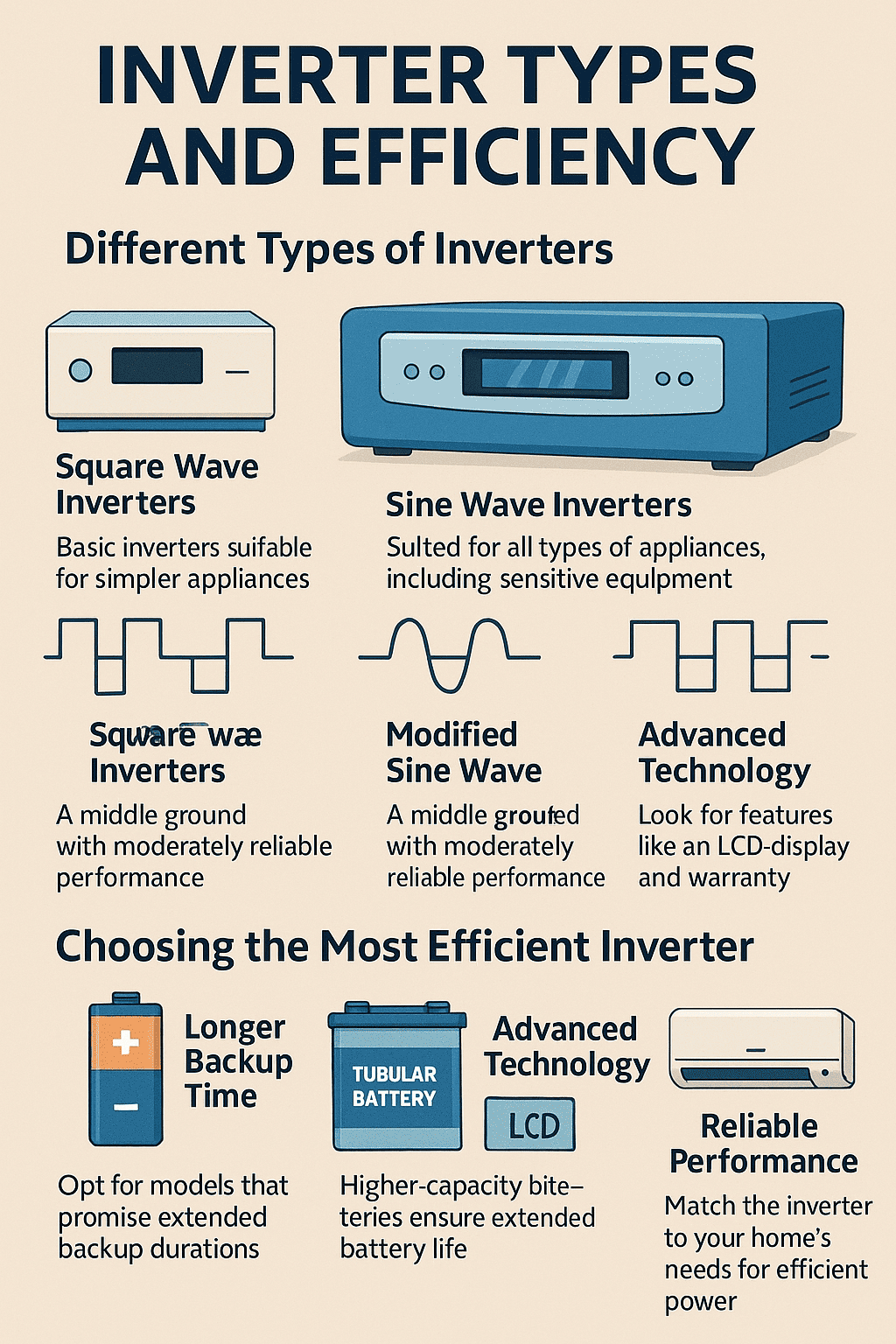
Inverter Types and Efficiency
Electricity is the lifeblood of modern homes, powering everything from lights and refrigerators to more sensitive appliances like air conditioners and computers. However, frequent power cuts can disrupt this smooth operation. That's where inverters come into play, providing an uninterrupted power supply to keep your household running efficiently. With various types and models available, understanding the differences between inverter types and choosing the most efficient one can significantly enhance your home's power backup system.
Different Types of Inverters
Inverters come in various types, each designed to cater to specific power needs and performance requirements. Understanding the types of inverters can help you make an informed decision when selecting one for your home.
- Square Wave Inverters: These are basic inverters suitable for simpler appliances like lights and fans. They are cost-effective but might not be ideal for sensitive devices.
- Sine Wave Inverters: Most suited for all types of appliances, including sensitive equipment, sine wave inverters provide a smoother wave output that ensures efficient performance without noise or disruption.
Modified Sine Wave Inverters are a middle ground between square and pure sine wave inverters. They offer moderately reliable performance and are suitable for devices not highly sensitive to power waveforms.
Different inverters provide different levels of efficiency and compatibility, and the right choice can offer peace of mind with reliable backup during power outages. It is crucial to ensure you select an inverter with a wave output that matches your appliances for consistent performance.
Choosing the Most Efficient Inverter
When it comes to selecting an efficient inverter, several factors come into play, from inverter technology to battery types and capacities. By understanding these aspects, you can ensure reliable performance and minimal maintenance needs.
One of the first considerations is the backup time you expect from your inverter. Opt for inverters that promise longer backup times, as these will be more beneficial during extended outages. This also ties into battery capacity—higher-capacity batteries, such as tubular batteries, are known for their durability and extended battery life.
Another factor is the advanced technology employed in more modern inverters. Look for models with an LCD Display to easily monitor performance, battery voltage, and status without hassle. Additionally, consider the warranty period offered—having more months of warranty can provide extra peace of mind.
Finally, choose an inverter that matches your home's needs. For instance, if you plan to power larger appliances such as an air conditioner, you'll need a more robust system, possibly a sine wave inverter, which better suits sensitive appliances. Reliable and efficient performance ensures that your home remains powered continuously, even during frequent power cuts, making your investment worthwhile.
Key Specifications to Consider
When choosing an inverter for your home, it's essential to focus on the key specifications that will ensure you get the most reliable and efficient performance. An inverter is a crucial device, especially in areas that experience frequent power cuts. It provides an uninterrupted power supply that safeguards your sensitive appliances. Consider factors such as battery capacity and battery type to ensure a dependable power inverter. By assessing these aspects, you'll have peace of mind knowing your home's power backup is up to standard.
Understanding Input and Output Specifications
Understanding an inverter's input and output specifications is crucial as it ensures compatibility with your home's electrical needs. Input specifications refer to the inverter's battery requirements, including battery voltage and battery types. Most home inverters operate efficiently with 12V or 24V systems, depending on the power needs.
As for the output specifications, you need to consider how much power the inverter can deliver to your appliances. Typically measured in watts, make sure the output capability aligns with the total power load of your household devices. This consideration will ensure consistent performance and reliable backup during power outages, providing peace of mind that sensitive appliances like air conditioners are adequately supported.
Role of Waveform in Performance
The waveform of an inverter is integral in determining the quality of power it supplies. There are primarily two types of waveforms: square wave and sine wave. Square wave inverters are more budget-friendly but may not be suitable for sensitive appliances. They’re best when used with simple tools or devices.
Sine wave inverters, like Leyu Inverters, provide superior performance by producing a cleaner and more reliable wave output. This type of inverter is recommended for households with a combination of essential and sensitive devices. The advanced technology used in producing a sine wave output results in consistent and efficient performance, ensuring minimal wear on your appliances. Overall, selecting the proper waveform significantly impacts an inverter's reliability and longevity.
Impact of Recharge Time
The recharge time of an inverter plays a vital role in maintaining its reliability, especially during consecutive power cuts. This specification indicates how quickly the inverter batteries can recharge after depletion. Faster recharge times mean that your inverter will be ready to deliver power again with less downtime, providing a smooth transition during outages.
Battery capacity and type, including tubular batteries and lead-acid batteries, directly influence recharge time. Tubular batteries are renowned for their minimal maintenance and extended battery life, allowing for significant backup time while maintaining a shorter recharge period. This combination of features contributes to efficient and reliable performance.
The right balance of recharge time, battery capacity, and technology ensures your home is always prepared for power interruptions, offering peace of mind and consistent performance.
Evaluating Warranty and Maintenance
When choosing an inverter for your home, evaluating warranty and maintenance aspects is crucial. These considerations can significantly influence the performance and longevity of your inverter, ensuring you have an uninterrupted power supply during frequent power cuts. A good warranty offers peace of mind, while proper maintenance ensures consistent performance and minimal issues in the long run.
Importance of Warranty Coverage
A reliable warranty is like a safety net for your home inverter. It not only provides peace of mind but also saves you from unexpected repair costs. Warranties typically cover manufacturing defects and specific components for a set period, often ranging from a few months to several years.
- A more extended warranty period often signals a manufacturer's confidence in their product.
- It's essential to understand what is covered in the warranty and if it includes the inverter batteries, as these are crucial for reliable backup.
- Remember, air conditioners and other sensitive appliances need a stable wave output, making a comprehensive warranty for wave inverters especially valuable.
Ultimately, a robust warranty ensures that your essential device remains in good working order, delivering uninterrupted performance with minimal maintenance hassle.
Maintenance Requirements for Longevity
Regular maintenance is key to the efficient performance and prolonged life of your home inverter. Just like any other essential device, inverters require attention to function optimally. By adhering to maintenance requirements, you can ensure reliable performance and an extended lifespan.
- First, make sure to check the battery voltage regularly. Whether you're using tubular or lead-acid batteries, maintaining the correct battery capacity is crucial for the inverter's consistent output.
- Keep the inverter unit clean and free from dust. Dust accumulation can affect its superior performance and result in frequent breakdowns.
- Lastly, follow the manufacturer’s guidance on maintenance, which might include periodic checks and the use of advanced technology to detect issues early.
By committing to regular maintenance, you ensure minimal maintenance needs and reliable backup, and you also enjoy peace of mind knowing your power inverter is ready to handle frequent power cuts efficiently.
Brand Reputation and Reliability
When investing in an inverter for your home, it's crucial to consider both brand reputation and reliability. An inverter is an essential device, especially in regions with frequent power cuts, providing an uninterrupted power supply to ensure the smooth operation of your household appliances. A reliable inverter not only ensures consistent performance but also delivers peace of mind, knowing that you have a dependable backup system in place. Furthermore, well-regarded brands often offer advanced technology solutions, superior wave output, and efficient performance to power everything from sensitive appliances to your everyday electronics.
Leading inverter brands in the market
Some of the leading brands in the inverter market have established a strong presence through quality products and outstanding service. These brands focus on advanced technology and design, which optimize battery capacity and maximize backup time. Brands like Leyu and others have become popular choices due to their comprehensive range of inverters, including square wave and wave inverters, suitable for various household needs.
Leyu Inverters: Known for reliable performance and minimal maintenance, Leyu inverters offer a variety of features, such as LCDs for easy monitoring, a multiple-month warranty for peace of mind, and options tailored for different power requirements.
Exide and Microtek: Along with Leyu, Exide and Microtek offer formidable options that focus on efficient energy use, consistent performance, and user-friendly designs. These brands have an extensive portfolio that caters to different power requirements and supports various battery types, including lead-acid and tubular batteries.
When choosing an inverter, considering a brand's history and customer satisfaction can guide you to the best possible choice for your home, ensuring reliable backup and a seamless power supply.
Customer reviews and trust
Customer reviews play a significant role in building trust and reliability in a brand. Positive reviews particularly highlight aspects like superior performance, extended battery life, and efficient inverter batteries. Many customers often praise specific models for their battery capacity and reliable backup during power outages.
On forums and review sites, testimonials often emphasize the significance of an inverter’s backup time and how it handles sensitive appliances such as air conditioners and home entertainment systems. Happy customers frequently point out the peace of mind that comes with a warranty-backed purchase from a reputable brand. This feedback is invaluable for potential buyers seeking assurance of quality and performance.
Therefore, when selecting the right inverter for your home, reading customer reviews can provide insights into the device's practicalities, compatibility with different battery types, and other users' overall satisfaction. Investing in an inverter trusted by many ensures an effective solution that meets your home’s power needs.
Features for Uninterrupted Power Supply
A reliable inverter is an essential device for ensuring an uninterrupted power supply in your home, especially in areas prone to frequent power cuts. Choosing the right inverter involves considering its ability to provide backup time, handle sensitive appliances, and ensure minimal maintenance. Modern inverters come equipped with advanced technology to cater to different needs, offering features that guarantee consistent performance and peace of mind. When selecting an inverter, it's crucial to consider the wave output, battery capacity, and battery life, all of which contribute to superior performance.
Automatic switch-over capabilities
Automatic switch-over capabilities are a notable feature in modern inverters, providing ease and reliability. This functionality allows the inverter to seamlessly transition from mains electricity to battery power during power outages. It's particularly beneficial for maintaining essential devices like refrigerators, computers, and air conditioners without interruption.
- Peace of Mind: With automatic switch-over, there's no need for manual intervention, ensuring a hassle-free experience.
- Sensitive Appliances Protection: This feature protects sensitive appliances by maintaining a constant power supply without fluctuations.
- Reliable Performance: Ensures that devices continue to operate smoothly, without any pauses or disruptions.
The advantage of such an automated system is that it reacts instantaneously, minimizing downtime and preventing potential damage caused by sudden power losses.
Noise levels during operation
The noise levels during an inverter's operation can significantly impact the comfort of a home environment. Most modern inverters are designed to operate quietly, making them ideal for residential use where peace and tranquility are valued. However, not all inverters are created equal, and their operational noise can vary based on their design and technology.
- Advanced Technology: Inverters incorporating advanced technology tend to function with minimal noise, contributing to a peaceful home environment.
- Minimal Disruption: Lower noise levels mean that the inverter can work seamlessly in the background without causing disturbances, whether in a living room or a study.
- Considerate of Location: Placing the inverter in a location away from the primary living areas can help reduce any noticeable noise further.
By choosing an inverter with low operational noise, you ensure that your household enjoys a balance between consistent performance and a tranquil atmosphere.
Pairing Inverters with the Right Batteries
Choosing the right inverter for your home is crucial for ensuring an uninterrupted power supply, especially during frequent power cuts. But what happens when you pair it with the wrong battery? The inverter may not deliver the reliable backup you need. Selecting the correct battery can result in consistent performance and peace of mind, leading to superior performance from your power inverter. This article will guide you through understanding the types of batteries suitable for inverters and how to optimize their combinations for efficient performance.
Battery types compatible with inverters
When it comes to powering your inverter efficiently, picking the appropriate type of battery is essential. Batteries are the heart of your backup power system, storing energy that the inverter transforms into electricity during outages. Several battery types are commonly used with inverters, with lead-acid batteries being widely preferred due to their affordability and reliable performance. These batteries are easy to maintain and offer a reasonable backup time.
- Tubular batteries are another popular choice, praised for their durability and long battery life. Ideal for areas with frequent power cuts, these batteries ensure reliable performance and minimal maintenance.
- Advanced technology batteries, such as lithium-ion batteries, boast a compact design and longer lifespan. These are particularly suitable for sensitive appliances and provide efficient energy utilization, albeit at a higher cost.
The choice largely depends on your budget, energy requirements, and the type of inverter you own.
Optimizing inverter-battery combinations
The power of a great backup system lies in the synergetic relationship between the inverter and its battery. Optimizing this combination can significantly enhance the backup time and ensure peace of mind during power interruptions. Start by considering the capacity of your battery — a higher battery capacity means more backup time, but also requires a larger budget.
For those with wave inverters, such as square wave or sine wave inverters, ensuring they match with a compatible battery type can lead to consistent and superior performance. Square wave inverters, although cost-effective, may not be best for sensitive appliances like air conditioners. Therefore, matching them with compatible batteries that provide stable wave output is essential.
- Battery voltage should align with the inverter’s requirements for efficient performance. Most home inverters work well with 12V batteries, but always verify with your inverter's specifications.
Understanding the battery’s capacity, voltage, and type can enhance the inverter's efficiency, ensuring reliable performance and minimal maintenance issues.
In sum, pairing the right inverter with the correct battery type and optimizing their integration can make all the difference in ensuring your home remains powered, no matter the circumstances.
Contact us to get a discounted quote.
If you're looking to get the most value for your purchase, now is a great time to contact us for a discounted quote! Our team is ready to assist you with all your inquiries and ensure you receive the best offer available.
- Get an exclusive discount tailored to your needs.
- Receive personalized customer service from our friendly team.
- Stay informed about the latest deals and promotions.
To make your experience as smooth as possible, please have the following information ready when you reach out:
- Your contact details (name, phone number, and email).
- Specific products or services you're interested in.
- Any budget preferences or constraints?
You can reach us via email, phone, or through our website's contact form. Our team is dedicated to providing you with a prompt and efficient response, ensuring you get the peace of mind you deserve.
Why wait? Contact us today and take advantage of our limited-time discounts!



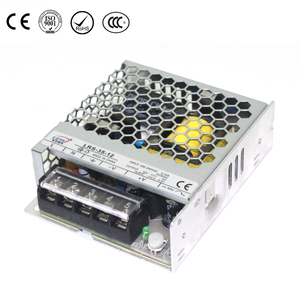
-134213.jpg)
